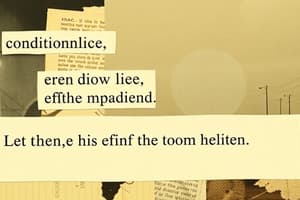Podcast
Questions and Answers
What type of conditional sentence is used to talk about universal truths and scientific facts?
What type of conditional sentence is used to talk about universal truths and scientific facts?
- Third Conditional
- Second Conditional
- Zero Conditional (correct)
- First Conditional
Which type of conditional sentence is used to talk about future events that are likely to happen?
Which type of conditional sentence is used to talk about future events that are likely to happen?
- First Conditional (correct)
- Second Conditional
- Third Conditional
- Zero Conditional
What is the correct form of the Second Conditional?
What is the correct form of the Second Conditional?
- If + past simple, would + infinitive (correct)
- If + past simple, will + infinitive
- If + present simple, will + infinitive
- If + present simple, would + infinitive
What is the correct form of the Third Conditional?
What is the correct form of the Third Conditional?
Which type of conditional sentence is used to talk about hypothetical past situations and their consequences in the present?
Which type of conditional sentence is used to talk about hypothetical past situations and their consequences in the present?
What is the correct form of the Mixed Conditional?
What is the correct form of the Mixed Conditional?
What is the primary function of conjunctions in a sentence?
What is the primary function of conjunctions in a sentence?
Which of the following is NOT an example of a coordinate conjunction?
Which of the following is NOT an example of a coordinate conjunction?
What is the key difference between conjunctions and prepositions?
What is the key difference between conjunctions and prepositions?
Which of the following is an example of a subordinate conjunction?
Which of the following is an example of a subordinate conjunction?
What is the function of correlative conjunctions?
What is the function of correlative conjunctions?
Which of the following sentences uses a coordinate conjunction?
Which of the following sentences uses a coordinate conjunction?
What is the function of 'because' in the sentence 'I'm tired because I didn't sleep well.'?
What is the function of 'because' in the sentence 'I'm tired because I didn't sleep well.'?
Which of the following is an example of a correlative conjunction pair?
Which of the following is an example of a correlative conjunction pair?
Flashcards are hidden until you start studying
Study Notes
Conditional Sentences
Conditional sentences describe hypothetical or uncertain situations and their consequences.
Zero Conditional
- Used to talk about universal truths and scientific facts
- If-clause in present simple, main clause in present simple
- Form: If + present simple, present simple
- Example: If you heat ice, it melts.
First Conditional
- Used to talk about future events that are likely to happen
- If-clause in present simple, main clause in future simple
- Form: If + present simple, will + infinitive
- Example: If it rains, I will take an umbrella.
Second Conditional
- Used to talk about unlikely or hypothetical situations in the present
- If-clause in past simple, main clause in would + infinitive
- Form: If + past simple, would + infinitive
- Example: If I won the lottery, I would buy a house.
Third Conditional
- Used to talk about past hypothetical situations and their consequences
- If-clause in past perfect, main clause in would have + past participle
- Form: If + past perfect, would have + past participle
- Example: If I had studied harder, I would have passed the exam.
Mixed Conditional
- Used to talk about hypothetical past situations and their consequences in the present
- If-clause in past simple, main clause in would have + past participle
- Form: If + past simple, would have + past participle
- Example: If I had taken that job, I would be rich now.
Note: Mixed conditional sentences can be confusing, as they mix the past simple with the conditional perfect. However, they are commonly used in spoken English.
Conditional Sentences
- Describe hypothetical or uncertain situations and their consequences
Zero Conditional
- Used for universal truths and scientific facts
- If-clause: present simple
- Main clause: present simple
- Form: If + present simple, present simple
- Example: If you heat ice, it melts.
First Conditional
- Used for future events that are likely to happen
- If-clause: present simple
- Main clause: future simple
- Form: If + present simple, will + infinitive
- Example: If it rains, I will take an umbrella.
Second Conditional
- Used for unlikely or hypothetical situations in the present
- If-clause: past simple
- Main clause: would + infinitive
- Form: If + past simple, would + infinitive
- Example: If I won the lottery, I would buy a house.
Third Conditional
- Used for past hypothetical situations and their consequences
- If-clause: past perfect
- Main clause: would have + past participle
- Form: If + past perfect, would have + past participle
- Example: If I had studied harder, I would have passed the exam.
Mixed Conditional
- Used for hypothetical past situations and their consequences in the present
- If-clause: past simple
- Main clause: would have + past participle
- Form: If + past simple, would have + past participle
- Example: If I had taken that job, I would be rich now.
- Note: Mixed conditional sentences combine past simple with conditional perfect, commonly used in spoken English.
Conjunctions
- A conjunction is a word that connects words, phrases, or clauses in a sentence.
- Conjunctions help to link ideas, show relationships, and provide cohesion in writing and speech.
Coordinate Conjunctions
- Coordinate conjunctions connect words, phrases, or clauses of equal importance.
- Examples of coordinate conjunctions include:
- And
- But
- Or
- So
- Yet
- Examples of sentences using coordinate conjunctions:
- I like reading books and watching movies.
- I wanted to go to the beach, but it was raining.
- Do you want to go to the movies or stay home?
Conjunctions Vs. Prepositions
- Conjunctions connect words or clauses, while prepositions show relationships between a noun or pronoun and other words in a sentence.
- Conjunctions join equal elements, while prepositions show location, direction, or other relationships.
Subordinate Conjunctions
- Subordinate conjunctions introduce dependent clauses and connect them to independent clauses.
- Examples of subordinate conjunctions include:
- Because
- Since
- After
- Although
- Unless
- Examples of sentences using subordinate conjunctions:
- I'm tired because I didn't sleep well.
- I've been busy since morning.
- I'll go to the gym after I finish work.
- Although I'm tired, I need to finish this project.
Correlative Conjunctions
- Correlative conjunctions are used in pairs to connect words or phrases of equal importance.
- Examples of correlative conjunctions include:
- Both...and
- Either...or
- Not only...but also
- Whether...or
- Examples of sentences using correlative conjunctions:
- I like both coffee and tea.
- Do you want to eat either pizza or sushi?
- I not only like reading books but also watching movies.
- Do you want to go to the beach or the park?
Studying That Suits You
Use AI to generate personalized quizzes and flashcards to suit your learning preferences.




